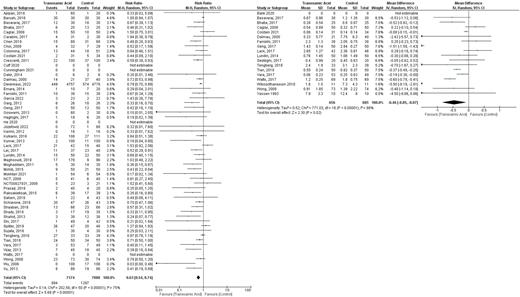Abstract
Background and Objective: Tranexamic Acid (TXA) is an anti-fibrinolytic agent that is effective in decreasing perioperative bleeding thus subsequently reducing the risk of blood transfusions in cardiac surgeries, however, there is limited data available on patients undergoing major non-cardiac surgeries. The primary objective of this meta-analysis is to elucidate the efficacy and safety of TXA in reducing the risk of blood transfusions in major non-cardiac surgeries where TXA is not standard of care.
Method: A comprehensive literature search was carried on PubMed (Medline), EMBASE, CENTRAL (Cochrane Library) and Google Scholar from inception till May 2022. The inclusion criteria were randomized controlled trials (RCTs) in adults (≥18 years) undergoing major non-cardiac surgeries for which TXA was not standard of care. The treatment group included patients receiving perioperative IV(Intravenous) TXA. The control group included placebo, usual-care or active comparator (Aprotinin, EACA(epsilon-aminocaproic acid), rFVIIa(activated recombinant factor), Topical TXA, Oral TXA, batroxobin). Primary outcomes were proportion of patients that received blood transfusion and volume of PRBCs (Packed Red Blood Cells) transfused at the longest follow-up. Review Manager Software (RevMan, version 5.3) was employed for statistical analyses and forest plots were created to visually analyze the results. The Mantel-Haenszel random effect model was applied. Higgins I2 test was used to evaluate heterogeneity across the studies. The bias assessment was carried out via Cochrane risk of Bias tool (Rob-2) and GRADE methodology was utilized to assess the certainty of evidence.
Results: A total of 82 RCTs, n=16,638 patients were included (TXA n= 8303 vs Non-TXA n=8335, TXA n=7986 vs Placebo n=7949, TXA n= 317 vs Comparator n=386). The mean age of included patients was 48.2 years and included surgery types were orthopedics, urology, plastic surgery, neurosurgery, general surgery, obstetrics, gynaecology, hepatobiliary and spine surgery. The pooled analysis of proportion of patients that received TXA showed a decreased need of transfusion (RR(Risk Ratio): 0.63, 95% CI;0.54,0.74, I2=75 %, P= <0.00001, low certainty) as compared to placebo or standard care or active comparator, however, the results were limited by significant heterogeneity (variable threshold for transfusion, ). The subgroup analysis according to baseline transfusion rate of 10-19% and ≥20%, trial size(≤50, 51-99,≥100) and risk of bias didn't report any significant difference in overall risk ratio or resolved statistical heterogeneity. TXA also reduces the volume of PRBCs transfused (mean difference)MD: -0.46, 95% CI; -0.85,0.07, I2=98%, P,0.00001, low certainty) and the length of stay in hospital (MD:-0.49, 95% CI;-0.91,-0.18,I2=82%, P= 0.002) as compared to control in patients undergoing major non-cardiac surgeries, however, TXA use was not found to be significantly associated with risk of deep vein thrombosis (RR: 1.05, 95% CI;0.78,1.40,I2=0 %, P= 0.76), pulmonary embolism (RR: 1.18, 95% CI;0.76,1.82,I2=0 %, P= 0.46), stroke (RR: 1.55, 95% CI;0.91,2.65,I2=0 %, P= 0.11), seizure(RR: 1.66, 95% CI;0.64,4.28,I2=0 %, P= 0.30), myocardial infarction (RR: 1.25, 95% CI;0.89,1.74,I2=0%, P= 0.19), all-cause mortality (RR: 1.02, 95% CI;0.77,1.36,I2=0 %, P= 0.88) and need for re-operation due to hemorrhage (RR: 0.80, 95% CI;0.58,1.11,I2=0 %, P= 0.18).Subgroup analysis based on trial size, baseline risk of transfusion and risk of bias didn't resolve statistical heterogeneity for the volume of PRBCs transfused.
Conclusion: Perioperative TXA administration reduces the risk of PRBC transfusion needs for patients undergoing major non-cardiac surgeries for which TXA is not standard of care as compared to placebo, standard care or other active comparators. However, the results are limited by significant heterogeneity and low quality of evidence. TXA group was also found to be associated with decreased length of stay in hospital. However, there was no significant increased risk of any major thrombotic event. There is need of further high quality prospective RCTs to provide conclusive evidence.
Disclosures
Anwer:Allogene Therapeutics: Research Funding; Janssen: Consultancy; BMS: Consultancy, Research Funding, Speakers Bureau.
Author notes
Asterisk with author names denotes non-ASH members.


This feature is available to Subscribers Only
Sign In or Create an Account Close Modal